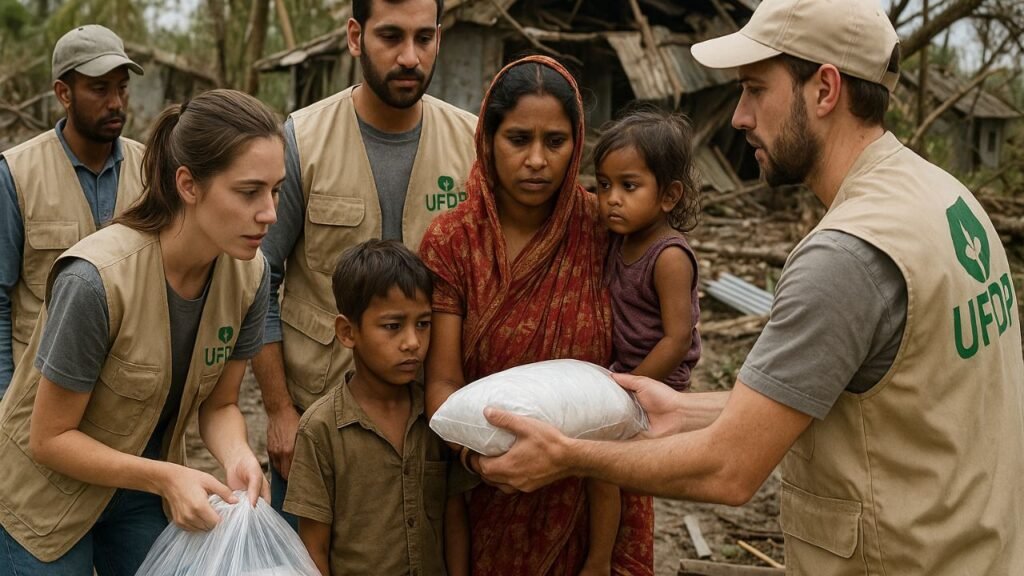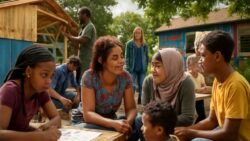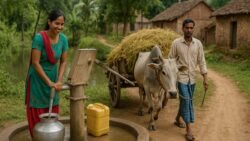UFDP Disaster Relief – Disasters and emergencies, whether natural or man-made, have devastating effects on families and communities. The United Foundation for Development & Peace (UFDP) has emerged as a crucial organization that steps in to provide immediate and sustainable support to affected populations. Their approach combines rapid response with long-term recovery efforts, ensuring that families not only survive the initial impact but also regain stability over time. By collaborating with local authorities, volunteers, and international aid organizations, UFDP ensures that relief reaches those in urgent need efficiently. Essential resources such as food, clean water, medical aid, and temporary shelters are distributed within hours of a disaster. Moreover, UFDP’s teams assess local conditions to identify the most vulnerable families, including women, children, and the elderly, who often face heightened risks during crises. Their strategic planning and on-the-ground presence have made them a trusted partner in disaster management across multiple regions. For more insights into effective emergency response strategies, see Red Cross Disaster Management.

Rapid Response and Field Operations
UFDP’s disaster relief operations are designed to act swiftly when crises strike. Their rapid response teams are trained to deploy within hours, equipped with emergency kits containing food, medical supplies, and sanitation essentials. Coordination with local government bodies ensures that interventions are aligned with ongoing emergency protocols. Additionally, UFDP uses advanced logistics systems to track relief materials, avoiding duplication and ensuring equitable distribution among affected communities. On-the-ground volunteers play a vital role in mobilizing community members, guiding them to safe zones, and providing psychological support to those traumatized by the event. According to UNOCHA, the efficiency of field operations in the first 72 hours is critical for minimizing fatalities and ensuring survival, a principle UFDP prioritizes rigorously. Their field assessments also help identify areas requiring long-term interventions, such as infrastructure repair, livelihood support, and education continuity for displaced children, ensuring a comprehensive recovery plan rather than a temporary relief solution.
 Education for All – UFDP’s Mission to Build Learning Spaces in Underprivileged Communities
Education for All – UFDP’s Mission to Build Learning Spaces in Underprivileged Communities
Collaboration with Local Communities
A key factor in UFDP’s success is its close collaboration with local communities. By engaging community leaders and volunteers, UFDP ensures that relief efforts are culturally sensitive and adapted to local needs. Community participation also facilitates better identification of the most vulnerable individuals, including families living in remote areas or marginalized neighborhoods. Local partnerships allow UFDP to leverage existing resources, from transportation networks to local health facilities, increasing the speed and reach of their interventions. Case studies show that disaster recovery is significantly more effective when local knowledge is incorporated into planning and execution, as highlighted by International Federation of Red Cross and Red Crescent Societies. UFDP also conducts training programs for community members, enabling them to respond independently to future emergencies, creating resilience and reducing dependency on external aid in the long term.
Medical Assistance and Psychological Support
Disasters often result in immediate injuries, outbreaks of diseases, and severe psychological trauma. UFDP’s medical teams provide both emergency healthcare and preventive interventions to affected families. Mobile medical units reach areas that are otherwise inaccessible due to damaged infrastructure, offering treatment for injuries, vaccinations, and critical maternal care. In addition, UFDP emphasizes psychological first aid, addressing anxiety, grief, and post-traumatic stress among survivors. Collaborating with organizations such as World Health Organization, UFDP ensures that health interventions follow international guidelines and best practices. Psychological support programs often include group counseling, recreational activities for children, and community workshops aimed at restoring a sense of normalcy. These interventions are essential for long-term recovery, as untreated physical and emotional trauma can hinder families from rebuilding their lives effectively.
 Vocational Training, Digital Literacy, and Life Skills Programs Led by UFDP Across Regions
Vocational Training, Digital Literacy, and Life Skills Programs Led by UFDP Across Regions
Long-Term Recovery and Livelihood Support
Beyond immediate relief, UFDP prioritizes long-term recovery, helping families regain financial independence and rebuild homes and infrastructure. This includes providing seeds and farming tools to agricultural communities, vocational training for youth and women, and microfinance support for small businesses. By investing in livelihood restoration, UFDP ensures that affected families are not trapped in cycles of dependency and vulnerability. The organization also works with local schools to resume education promptly, mitigating the impact of disasters on children’s learning and future opportunities. According to UN Disaster Risk Reduction reports, integrating livelihood and education initiatives into recovery plans significantly enhances community resilience, a principle UFDP actively implements. Through these multi-faceted strategies, UFDP demonstrates how coordinated disaster relief can evolve into sustainable development, empowering families to recover with dignity and stability.



